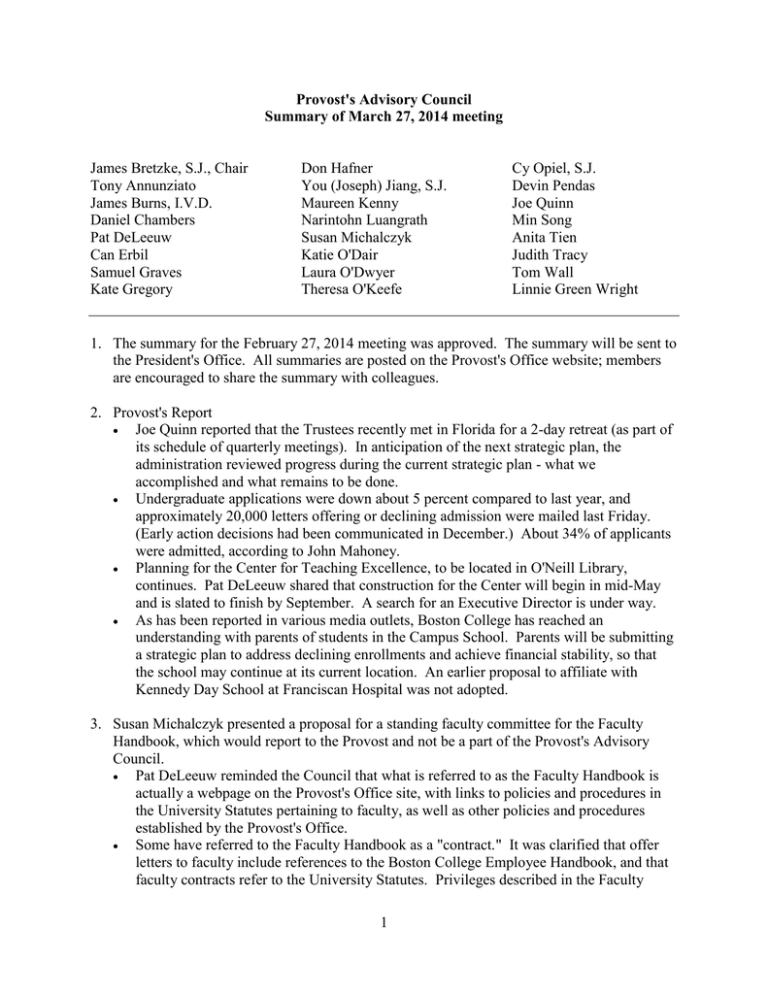
Provost's Advisory Council
Summary of March 27, 2014 meeting
James Bretzke, S.J., Chair
Tony Annunziato
James Burns, I.V.D.
Daniel Chambers
Pat DeLeeuw
Can Erbil
Samuel Graves
Kate Gregory
Don Hafner
You (Joseph) Jiang, S.J.
Maureen Kenny
Narintohn Luangrath
Susan Michalczyk
Katie O'Dair
Laura O'Dwyer
Theresa O'Keefe
Cy Opiel, S.J.
Devin Pendas
Joe Quinn
Min Song
Anita Tien
Judith Tracy
Tom Wall
Linnie Green Wright
1. The summary for the February 27, 2014 meeting was approved. The summary will be sent to
the President's Office. All summaries are posted on the Provost's Office website; members
are encouraged to share the summary with colleagues.
2. Provost's Report
Joe Quinn reported that the Trustees recently met in Florida for a 2-day retreat (as part of
its schedule of quarterly meetings). In anticipation of the next strategic plan, the
administration reviewed progress during the current strategic plan - what we
accomplished and what remains to be done.
Undergraduate applications were down about 5 percent compared to last year, and
approximately 20,000 letters offering or declining admission were mailed last Friday.
(Early action decisions had been communicated in December.) About 34% of applicants
were admitted, according to John Mahoney.
Planning for the Center for Teaching Excellence, to be located in O'Neill Library,
continues. Pat DeLeeuw shared that construction for the Center will begin in mid-May
and is slated to finish by September. A search for an Executive Director is under way.
As has been reported in various media outlets, Boston College has reached an
understanding with parents of students in the Campus School. Parents will be submitting
a strategic plan to address declining enrollments and achieve financial stability, so that
the school may continue at its current location. An earlier proposal to affiliate with
Kennedy Day School at Franciscan Hospital was not adopted.
3. Susan Michalczyk presented a proposal for a standing faculty committee for the Faculty
Handbook, which would report to the Provost and not be a part of the Provost's Advisory
Council.
Pat DeLeeuw reminded the Council that what is referred to as the Faculty Handbook is
actually a webpage on the Provost's Office site, with links to policies and procedures in
the University Statutes pertaining to faculty, as well as other policies and procedures
established by the Provost's Office.
Some have referred to the Faculty Handbook as a "contract." It was clarified that offer
letters to faculty include references to the Boston College Employee Handbook, and that
faculty contracts refer to the University Statutes. Privileges described in the Faculty
1
Handbook, such as use of institutional email for retired faculty, are University policies
subject to change over time and are not part of faculty contracts.
A member of the Provost's Advisory Council reported that he had received many
messages from colleagues, one of whom had written that a faculty committee would
enhance faculty engagement, promote perceptions of fairness, and aid in communication
to faculty.
Another Council member asked about the authority of the proposed committee. It was
explained that this committee would provide another avenue for faculty discussions of
policy and proposals for changes in policy.
One member of the Council raised questions about additional administrative structures
and whether a standing faculty committee is necessary. It was suggested that a physical
handbook (as opposed to one that is web-based) would be helpful.
The discussion will be continued at the next meeting of the Provost's Advisory Council.
4. Paul Chebator, Dean of Students, and Richard DeCapua, Associate Dean of Student Conduct,
joined Council to discuss the student conduct system at the University.
They noted that infractions of student conduct generally occur on two planes--minor
infractions which may recur periodically, and more serious violations (such as sexual
violence). It was noted that in cases of the former, there are well-defined processes and
policies that appear to function well. Serious violations require significant attention and
coordination, and efforts are focused on students who commit such violations.
For example, since alcohol consumption and sexual assault are often linked, programs to
educate students about the effects of alcohol have been initiated. It was stated that the
consumption of alcohol undermines student civility on campus and endangers students.
A question was asked about parental involvement, and what the legal limits are for
parental involvement. It was observed that parental involvement has shifted generally
from supporting University processes, to a tendency to challenge University policies and
even invoke litigation.
It was noted that the legal age of drinking is 21, and a question was asked about why
students engaged in under-age drinking are not consistently confronted on legal grounds.
The response was that the University does not ignore the law, but has chosen to approach
students less confrontationally and engage them in conversations about their behavior and
its implications.
It was reported that students are fearful of being brought up for student conduct issues,
and so do not want to seek help when they are intoxicated. There is a "help-seeker"
policy so that students who approach campus staff for medical assistance when they or
their friends are intoxicated will not be penalized; intoxication is treated foremost as a
health issue and not a student conduct violation.
2
